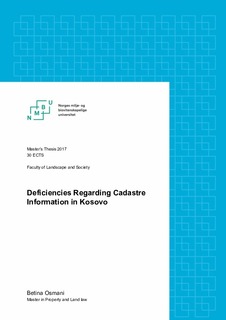| dc.contributor.advisor | Hegstad, Einar | |
| dc.contributor.advisor | Meha, Murat | |
| dc.contributor.advisor | Qaka, Muzafer | |
| dc.contributor.author | Osmani, Betina | |
| dc.coverage.spatial | Kosovo | nb_NO |
| dc.date.accessioned | 2017-10-03T13:34:56Z | |
| dc.date.available | 2017-10-03T13:34:56Z | |
| dc.date.issued | 2017 | |
| dc.identifier.uri | http://hdl.handle.net/11250/2458135 | |
| dc.description.abstract | The main goal of this paper is to describe land administration in Kosovo and its challenges in form of deficiencies regarding the cadastre and the importance of having a trustworthy system. The lands history, culture and legal framework all work together in making the register of property that is today.
Kosovo is a part of an ongoing transformation as a country, and undergoing political, cultural and social changes. Much have been done in a short amount of time, and have had and are having struggles along the way. Building up a new state with laws, regulations and institutions that had to be rebuild after the war.
This thesis specifies to a degree on inheritance, but because Kosovo is facing several major deficiencies in the cadastre due to its history and culture, I saw it as important to illustrate these too.
Findings from my research questions briefed up:
1. What are the most significant deficiencies in the cadaster in Kosovo?
- Evidence suggest that 40 % of properties remain registered in the name of the deceased, and 30 % of applicants that try to formalize their rights are not able to do so because their families did not initiate inheritance proceedings, and the property is registered in the name of the deceased. Many families choose not to go through with inheritance proceedings because they already feel that their property rights are secure without having the formal title. They do not see or know the benefits of a having a formal title. Economy also plays a role her.
- Graphic and written cadastral documents that was registered in the period 1983 to 1999 are missing in all municipalities in Kosovo. These documents were confiscated by Serbian employees during the war in 1999. Kosovo is therefore missing a significant amount of cadastre information.
- Kosovos status as an autonomous province was lifted in 1989, and following was a 10-year period of ethnic discrimination. Property transactions between and to Kosovo Albanians was made illegal in the period between 1989 and 1999. A consequence of this was that the cadastral records remained incomplete and inaccurate because the contracts were done verbally and not registered.
- A study concerning informal buildings in Kosovo (Potsiou 2016) estimated that more than 90 % of the new buildings that are sold are based on mutual trust; without a permit and/or title. The lack of property permits and ownership titles does not affect the market value, because the buyers are used to it being like this because they do not have other available options or are not well informed of the risk.
2. What challenges does deficiencies in the cadastre information entail?
- The biggest challenge is the lack of a trustworthy register of property. The register should work as a guarantee of ownership, but when it is estimated that 40 % of the registered properties are not in the names of the right owners the trust to the cadastre minimizes.
- Immovable properties registered under the name of deceased persons is an issue the property tax authorities are currently facing. Property tax is important for the municipalities to increase the own-source income.
3. How do the municipalities deal with the deficiencies?
- The municipalities cannot do much more than guide the users. The deficiencies cannot be corrected before the correct documentation is sent in. They try to encourage people to finalize the inheritance proceedings, and inform of the importance of this. | nb_NO |
| dc.description.abstract | Hovedformålet med denne oppgaven er å beskrive eiendomsregistrering i Kosovo og de utfordringer knyttet til informasjonen i matrikkelen, samt viktigheten av å ha et pålitelig system for dette. Kosovos historie, kultur og juridisk rammeverk skaper utgangspunktet for hvordan eiendomsregistreringen er i dag.
Kosovo er i kontinuerlig transformasjon som land, og gjennomgår politiske, kulturelle og sosiale endringer. Mye har blitt gjort på kort tid, og det har vært en lang kamp som enda ikke er over. Å bygge opp en ny stat med lover, forskrifter og institusjoner som måtte gjenoppbygges etter krigen er en stor oppgave.
Denne masteroppgaven spesifiserer i en grad på arv, men fordi Kosovo står overfor flere store mangler i matrikkelen på grunn av sin historie og kultur, så jeg det som viktig å illustrere disse også. | nb_NO |
| dc.language.iso | eng | nb_NO |
| dc.publisher | Norwegian University of Life Sciences, Ås | nb_NO |
| dc.rights | Attribution-NonCommercial-NoDerivatives 4.0 Internasjonal | * |
| dc.rights.uri | http://creativecommons.org/licenses/by-nc-nd/4.0/deed.no | * |
| dc.subject | Kosovo | nb_NO |
| dc.subject | Cadastre | nb_NO |
| dc.subject | Land management | nb_NO |
| dc.title | Deficiencies regarding cadastre information in Kosovo | nb_NO |
| dc.type | Master thesis | nb_NO |
| dc.description.version | submittedVersion | nb_NO |
| dc.description.localcode | M-EIE | nb_NO |

